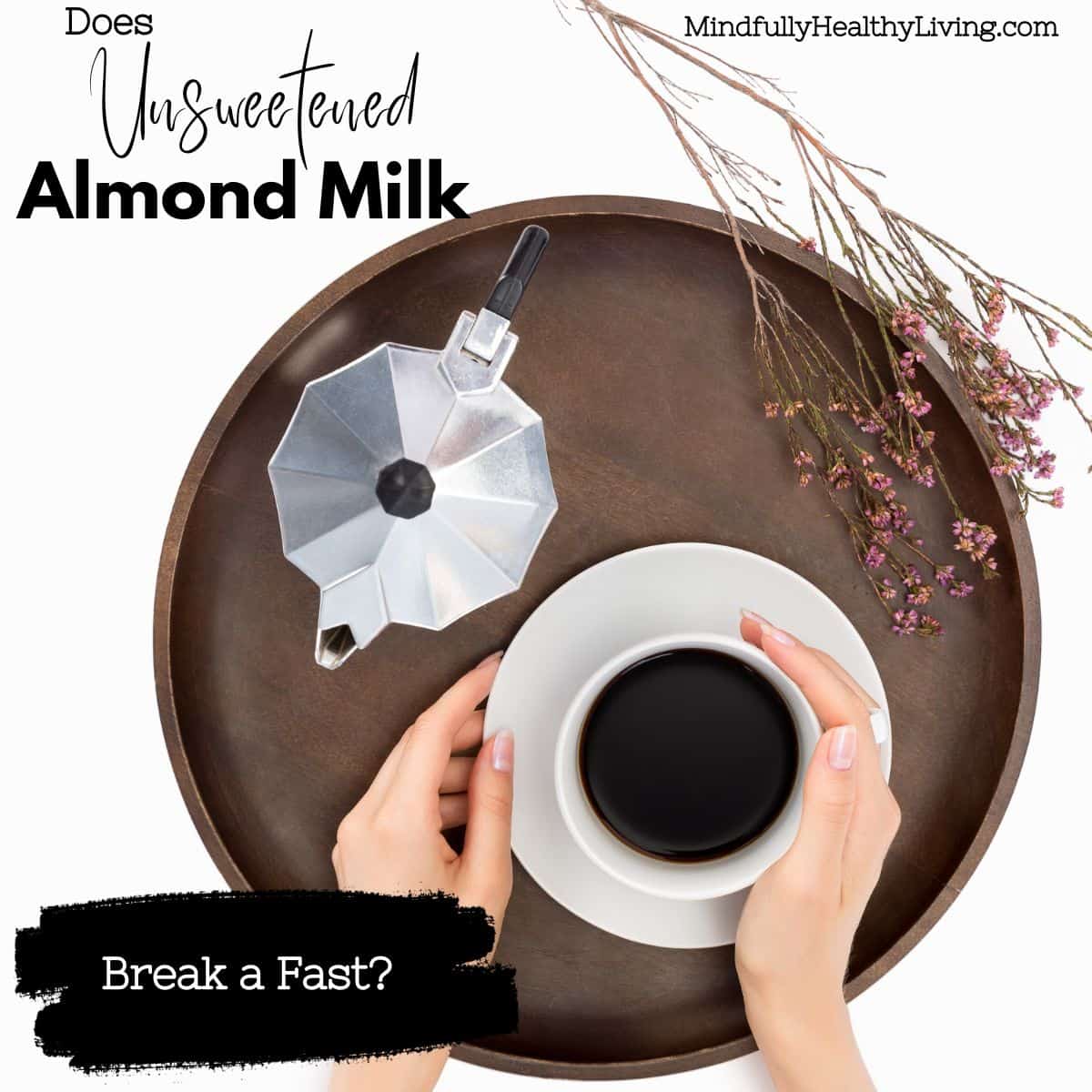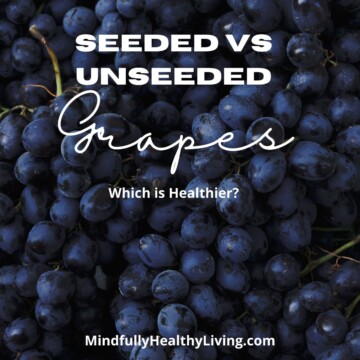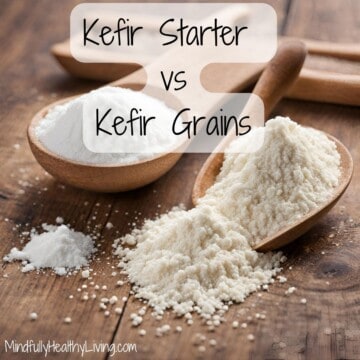"Does unsweetened almond milk in coffee break a fast?" Is a question with significant implications for those focused on fasting for weight loss and overall health. This is one of the most common questions I have heard from many of my nutrition coaching clients over time, which is why I decided to write this article!
The Short Answer: Listen to your body and go easy. For some, a small amount may be ok. However, technically any calories are considered breaking a fast. Read on to learn more.
My aim is to provide you with reliable, thoroughly researched information to make informed decisions about what goes into your morning cup of coffee while adhering to your fasting routine.
Understanding the impact of a splash of almond milk on your fasting state is vital, especially when considering the importance of keeping calorie intake to a minimum during fasting hours. We examine the role of unsweetened almond milk and whether it can coexist with the principles of fasting without triggering an insulin response that could interrupt the process of fat-burning.
In our past explorations, we've delved into how MCT oil in your coffee fits into a fasting regimen, such as with bulletproof coffee, and provided a comprehensive guide to the best coffee creamers for those monitoring their blood sugar levels.
Our low-carb content is based on the principles of holistic nutrition. It spans from detailed clean keto meal planning to a comparative guide that distinguishes between hcg and keto diets, a clean keto sweeteners guide, along with several delicious low-carb meals to enjoy all tailored to enrich your morning routine and overall health.
Jump to:
What Breaks a Fast?
When you're committed to an intermittent fasting window, the question of what actually 'breaks a fast' is pivotal. A key concept is understanding that true fasting equates to zero calories.

Any intake of calories signals your body to exit the fasted state, revving up your metabolic rate and digestive processes.
During your fasting window, the goal is to keep insulin levels stable. This helps to improve insulin sensitivity.
Many experts have stated that unsweetened tea, herbal tea, and coffee, and some say that even MCT oil (medium-chain triglycerides) in coffee and tea are ok as long as there is zero sugar. Although this concept is controversial.
The unsweetened low-calorie drinks mentioned above, including your morning coffee, should ideally remain black. Why? Because cream and milk have calories and can cause a spike in blood glucose, especially when they have added sugars. These things prompt an insulin response and effectively end the fasted state.
Other Options
But what about those who don't prefer their coffee black? Here’s where the term 'good option' comes into play. A good option is something that minimizes the impact on blood glucose levels and keeps insulin stable.
Unsweetened additives with minimal to zero calories like monk fruit or stevia can be considered safe bets for most people, but it's always best to monitor how your body reacts individually. We highly recommend avoiding artificial sweeteners as they are linked to several health issues.
If you absolutely must have some form of cream in your coffee, a small splash of unsweetened almond milk or coconut milk may be minute enough in very small amounts to not trigger a blood sugar spike and derail your hard work at maintaining a fast. The term is controversial but is being adopted more and more frequently.
The method of eating small amounts of calories during a fasting window is called "dirty fasting."
This method is slightly tricky and controversial so we will get into the details a bit more in the sections below.
What is Dirty Fasting?
Dirty fasting is a modern twist on traditional fasting, where instead of sticking to zero calories, you allow for small indulgences within the fasting window. Think of it as the gray area of fasting—where a strict no-calorie rule is softened to include a splash of milk in your black coffee or a spoonful of coconut oil.

This flexibility is why it's considered 'dirty,' although it's anything but unclean.
The concept hinges on consuming very few calories—often suggested to be under 50—to remain in a fasted state. While traditionalists might balk at this, dirty fasting embraces practicality and a bit of comfort.
You might find a morning coffee enhanced with a touch of healthy fats like MCT oil or grass-fed butter, both popular among keto followers for their ability to help maintain ketosis, the body's fat-burning mode.
Bone broth also fits into dirty fasting, providing a nutrient-dense, low-calorie boost. And let’s not forget about apple cider vinegar, just a splash, known for its potential in stabilizing blood sugar levels.
However, while recognizing the adaptability of dirty fasting, we still recommend steering clear of processed foods, dairy, and sugars (including fruit juices) during the fasting window.
These can disrupt the delicate balance of ketosis acquired through fasting and the dairy and sugars may impact insulin levels more significantly than the alternative additives mentioned during fasting. Unsweetened nut milks (except for hazelnut and oat milk) have fewer calories and grams of sugar than cow's milk and its derivatives like heavy cream.
What are the Rules for Fasting?
When it comes to fasting, there are fundamental rules that serve as the roadmap for achieving your health and wellness goals. There are different methods for fasting and intermittent fasting but the cornerstone of these rules is the eating window — this is the time frame during which all your day's eating takes place.

Sticking to this window is crucial, as it helps regulate your body's natural rhythms and promotes the use of body fat for energy when you're not eating.
The contents of your eating window are just as important as its timing. Ensuring that you get essential nutrients during this period is vital.
A diet filled with vitamins, minerals, and fiber-rich foods can bolster your health and contribute positively to your metabolic rate.
Fasting goals vary from weight loss to improving overall health, and each goal dictates the pattern of your fast.
Those looking to reduce body fat should choose foods that support an efficient metabolic rate, aiding the body in its shift to fat-burning during fasting periods.
Consistency is a significant factor that underpins the success of any fasting routine. A consistent eating pattern makes fasting more manageable and helps the body adjust and respond better to periods of not eating.
Ultimately, the rules of fasting are about creating a structured yet flexible framework that promotes eating nutrient-dense foods within a specific window and establishing a consistent eating pattern. These practices work together to support your body's natural functions and contribute to your overall health.
The Benefits of Intermittent Fasting
Intermittent fasting has gained popularity as a strategy for those aiming to improve their health holistically. This approach cycles between periods of eating and fasting, offering several potential health benefits.

A significant benefit of intermittent fasting is its role in improving insulin sensitivity, which is crucial for those managing insulin resistance. By moderating the timing of meals, fasting can help maintain consistent blood sugar levels, potentially lowering the risk of developing type 2 diabetes.
The practice encourages periods of rest for the digestive system along with the mindful selection of foods during non-fasting periods which can have a cumulative effect on blood pressure levels.
Emerging research points to the positive effects of fasting on brain function. This practice may encourage the growth of new nerve cells, enhance memory, and protect against cognitive decline, contributing to overall brain health.
Additionally, intermittent fasting can lead to reduced inflammation, a common thread in chronic diseases. Lower inflammation may correlate with a healthier, longer life, offering a compelling reason to consider fasting as part of a healthy lifestyle.
Calories in Almond Milk
For those exploring dairy alternatives, unsweetened almond milk stands out as a great alternative that's both light in calories and gentle on the stomach—especially relevant for individuals with lactose intolerance. Unlike traditional dairy products, almond milk offers a delightful, nutty flavor with a fraction of the calories found in dairy or soy milk.

When it comes to incorporating almond milk into your diet, it's a great choice for its minimal impact on your daily calorie intake. In small quantities, it can be added to your regular coffee without the guilt.
Understanding the type of almond milk you're using is crucial. Sweetened varieties may contain added sugars and higher grams of carbs. We recommend making homemade almond milk.
A standard cup of unsweetened almond milk typically contains as little as 30 to 50 calories, making it a low-calorie option. In terms of macronutrients, it's also lightweight, with around 1 gram of protein and a minimal amount of carbohydrates.
However, almond milk is not just about what it lacks. It's a good source of Vitamin E, a nutrient essential for skin health and immune function.
Moreover, almond milk contains healthy fatty acids that can benefit your heart and brain.
Its low calorie and carb content, coupled with its beneficial fats, make it a fitting choice for those monitoring their intake for weight management or dietary reasons.
 Califia Farms - Organic Uns...Shop on Amazon
Califia Farms - Organic Uns...Shop on Amazon
Nutrition Facts of Almond Milk
Nutrition Facts
Serving Size 1 cup (240ml)
Calories: 30 % Daily Value*
Total Fat 2.5g 3%
Saturated Fat 0g 0%
Trans Fat 0g
Cholesterol 0mg 0%
Sodium 160mg 7%
Total Carbohydrate 1g 0%
Dietary Fiber 1g 4%
Total Sugars 0g
Protein 1g 2%
Vitamins & Minerals
Vitamin D 2mcg 10%
Calcium 300mg 25%
Iron 0mg 0%
Potassium 35mg 0%
Vitamin E 7.3mg 50%
*The % Daily Value tells you how much a nutrient in a serving of food contributes to a daily diet. 2,000 calories a day is used for general nutrition advice.
FAQ
Technically, a true fasting period includes zero calories. However, recently experts have begun to allow infrequent and very small amounts of calories that don't include sugar in the fasting window. Drinking your coffee black is best. However, some have been able to still maintain great results with high-quality and unsweetened almond milk in their coffee. This is due to its low-calorie content.
You can add zero-calorie sweeteners, a splash of unsweetened almond milk, or a sprinkle of cinnamon to your coffee. These are unlikely to break a fast. However, any calories technically break a fast so be mindful of the amount of milk you use and what kind. Always opt for additions that do not trigger a significant insulin response to maintain the fasting state.
Unsweetened almond milk typically has a low glycemic index and contains minimal carbohydrates. This means it's unlikely to cause a significant spike in insulin levels. However, be mindful of the portion size and any flavored varieties that may contain added sugars.
Sixteen hours is often cited as an effective fasting duration to trigger autophagy and switch the body's primary energy source to fat, which can aid in weight loss and improve metabolic health. This time frame strikes a balance that many find sustainable and beneficial.
During intermittent fasting, the best milk is one that has minimal impact on insulin levels, such as unsweetened almond milk or coconut milk; they're low in calories and carbohydrates, making them suitable for maintaining a fasted state. Always choose milks that are unsweetened and free from unnecessary additives to align with fasting goals.
Tips for Adding Almond Milk to Coffee During Fasting
If you're interested in the benefits of fasting but can't resist a good brew first thing in the morning, there's good news. Almond milk can be your ally, ensuring your coffee ritual has a minimal impact on your fast.

When it comes to fasting, every calorie counts, and keeping your intake low is crucial. Unsweetened almond milk is often heralded as a great option for a light splash in your morning coffee. Truly, we believe the best option is a black coffee or one lightly sweetened with pure monk fruit.
However, in small amounts, it should not significantly impact your energy intake, making it fasting-friendly.
The key is moderation and quality. Adding a modest amount of organic almond milk that has no added sugars to your coffee shouldn't have a significant impact on the fasted state. It’s the perfect tweak for coffee enthusiasts looking to preserve the essence of their beloved morning cup without breaking their fasting goals.
However, remember that not all almond milk is created equal. Opt for unsweetened varieties without added sugars or flavorings to ensure you’re not inadvertently consuming extra calories or carbs that could disrupt your fast. The best way to ensure this is to make your own nut milk!
In essence, if you're fasting but the thought of black coffee doesn't appeal to you, almond milk can be a saving grace. By choosing unsweetened almond milk and being mindful of the quantity, you can enjoy the warmth of your favorite morning beverage without stepping away from your fasting path.
The best advice is to pay attention to your body, and keep track of your progress with a daily journey that includes your caloric intake, experiences, symptoms, and results!
Final Thoughts
Do you use a splash of milk in your morning coffee while intermittent fasting? What has been your experience? Share with us in the comments below!
Have a healthy day,
Natalie







Comments
No Comments